- Home
- Rosamunde Pilcher
The Carousel Page 10
The Carousel Read online
Page 10
Like the very best sort of father. I thought of Chips, his pipe in his mouth, listening as the young Daniel told him about Annabelle Tolliver and the baby. Annabelle, with her dark hair and her cat face and her grey eyes and her secret smile.
It’s your child, Daniel.
There were other voices. Lily Tonkins. Mrs. Tolliver can’t be bothered to look after the child, then she should pay some other person to do the job. Lily shrill with indignation, beating out her resentment on a bowl of batter.
And my mother, exasperated because I would not conform to the pattern that she had endeavoured all her life to cut for me.
Honestly, Prue, I don’t know what you’re looking for.
I had told her that I wasn’t looking for anything. But there was a word—“serendipity.” It was such an odd, strange-sounding word that I had once looked it up in a dictionary.
serendipity n: faculty of making happy discoveries by accident
I had discovered. Daniel. Watched him walking from the little railway station, along the old seawall, towards me, into my life. This evening, “How little we know each other,” he had said, and up to a point, that was true. A day. Two days. Too short, one would have said, to achieve anything but the most superficial relationship.
But this was different. For me time and events had become miraculously encapsulated, so that I felt as though I had lived an entire lifetime with him in the course of the past twenty-four hours. It was hard to realise that I had not known him forever, that our two separate existences were not already spun together, like strands in a single skein of wool.
I wanted it to go on being this way. I was prepared to let him go his way, as Phoebe had let him go. I was wise enough for that. But I did not want to lose him. And I knew that the odds were against me. Partly because Daniel was the man that he was—an artist, restless, seeking, he would always need to be free. But infinitely more formidable was the memory of Annabelle, the existence of Charlotte.
Charlotte. Who knew what traumas Charlotte had suffered, foisted upon a man who was not her father and who must surely know that he was not her father. I had taken an instant dislike to him during those brief moments I had seen him on the train, watched his impatience with the little girl and recognised a total lack of affection as he thrust the ten-pound note into her hand, as though he were paying off some tiresome debt.
And Annabelle. So much unhappiness to answer for. It was no fun creating havoc if she couldn’t leave behind her a trail of guilt and remorse. She had done that, all right, with her wayward passions, destructive as a hurricane. Now the hurricane seemed to have blown up again, and I was afraid because I could see it tearing Daniel and me apart forever.
I can’t go on running away from the inside of my own head.
I thought of the house in Greece, the sugar-cube house above the sea, with the whitewashed terrace and the bright geraniums. A scrap of poetry, half-learned, half-forgotten, flew like a ghost through the back of my mind.
Oh, love, we two shall go no more to lands of summer beyond the seas.
From the mantelpiece, Phoebe’s clock chimed a single, silvery note. One o’clock. I laid down the empty coffee mug and with an effort pulled myself from the deep comfort of Chips’s armchair. Still not sleepy, I went over to Phoebe’s radio and fiddled with knobs, searching for some early-hour music. I found a recorded programme of classic pop, recognised a tune that dated back to the years of my growing up.
God bless you,
You made me feel brand new
For God blessed me with you.
The toy carousel still stood on the table where Charlotte had played with it. It had never been put back in its cupboard, and now I went to do this, for fear that dust should seep into its ancient mechanism and cause it to grind to a final halt. I couldn’t bear to think of it broken, forgotten, never played with again.
I simply don’t know which is my favourite …
I wound the handle and gently released the lever. Slowly, sedately, the brightly painted animals revolved, their tinselly bridles sparkling in the light from the fire, like decorations on a Christmas tree.
Without you,
Life has no meaning or rhyme
Like notes to a song out of time.
There was always tomorrow. I could not be sure whether I dreaded the day we had planned or looked forward to it. There seemed to be too much at stake. I only knew that we would go, the three of us, to Penjizal and look for the seals. Beyond tomorrow I could not imagine, simply hope that some good would come of our being together. For Daniel’s sake. For Charlotte. And, selfishly, for myself.
The mechanism ran down; the turntable slowly came to a halt. I stooped and lifted the carousel off the table and put it away in its cupboard; closed the doors, turned the key. I put the guard in front of the fire, switched off the radio, turned off the light. In the darkness, I went upstairs.
* * *
I awoke early, at seven, to the sound of a big old herring gull screaming at the new day from the roof of Chips’s studio. My drawn curtains framed a sky of the palest blue veiled in a haze reminiscent of the hottest days of summer. There was no wind, no sound but the cry of the gull and the whisper of an incoming tide, trickling to fill the gullies and sand pools of the estuary. When I got up and went to the window, it was very cold, almost as though there had been a frost. I smelt the seaweed, tarry rope, and the clean saltiness of fresh seawater surging in from the ocean. It was a day made to order for a picnic.
I dressed and went downstairs and made coffee for myself and breakfast for Phoebe. When I took this up to her, I found her already awake and sitting up against the pillows, not reading but simply gazing with pleasure as the warmth of the sun on that perfect autumn morning burned away the last of the mist.
I put the breakfast tray on her knees.
“These are the sort of mornings,” she said without preamble, “that I’m certain one remembers when one is very, very old. Good morning, my darling.” We kissed. “What a day for a picnic.”
“Come with us, Phoebe.”
She was tempted. “It depends where you’re going.”
“Daniel’s going to show us the way to Penjizal. He said something about a tidal rock pool where the seals come and swim.”
“Oh, it’s so beautiful! You’ll be enchanted. But no, I think I’d better not come. The path down the cliffs is a little too precipitous for a person with only one arm. It would be too tiresome for you if I lost my balance and went flying over the cliff into the sea.” She went into gales of her usual laughter at the very idea. “But the walk down from the farmhouse at the top is magical. There are wild fuchsias everywhere, and in summertime the valley is humming with dragonflies. What are you going to take with you to eat? Ham sandwiches? Have we got any ham? What a pity you can’t make cold casserole sandwiches, there’s so much left over from last night. I wonder if Daniel got in touch with Lewis Falcon. I’ve heard that he’s got the most beautiful wild garden out there at Lanyon…”
She chattered on, her conversation, as always with Phoebe, darting from one intriguing subject to the next. It was tempting to forget about the day ahead; to lose all sense of time and simply to settle down to spending the rest of the morning sitting there on the end of Phoebe’s downy bed. But, with the coffee pot empty and the sun’s rays shining obliquely through the open window, I heard from downstairs the slamming of the kitchen door and knew that Lily Tonkins had arrived on her bicycle.
I looked at Phoebe’s clock. “Heavens, it’s past nine o’clock. I must get moving.” I climbed reluctantly off the bed and started to gather up cups and plates, stacking them on Phoebe’s tray.
“So must I.”
“Oh, don’t get up. Stay there for another hour or so. Lily likes it when you do that. She can get on with her polishing without having to shunt you around all the time.”
“I’ll see,” said Phoebe, but as I went out the door, I saw her reach for her book. She was reading C. P. Snow, and I envied her her wa
rm bed and that wonderful sonorous prose and guessed that it would be midday at least before she put in an appearance downstairs.
In the kitchen I found Lily tying on her apron.
“Hello, Prue, how are you this morning? Lovely, isn’t it? Ernest said last night, this was what was going to happen. He said that wind was going to blow the dirty weather away. And coming down the road from the church, you’d think it was warm as June. Had a good mind not to come in to work today; just go down to the beach and put my feet in the tide.”
From the hall, the telephone began to ring.
“Now,” said Lily, as she invariably did when this happened, “who can that be?”
“I’ll go,” I said.
I went back to the hall and sat on the old carved chest where the telephone lived and picked up the receiver.
“Hello.”
“Phoebe?” A woman’s voice.
“No. This is Prue.”
“Oh, Prue. This is Mrs. Tolliver. Is Phoebe there?”
“I’m afraid she’s still in bed.”
I expected her to apologise for the early call and to say that she would ring back later. But instead she persisted. “I must speak to her. Can she come to the telephone?” And there was an urgency to her voice, an unsteadiness, that filled me with nameless apprehension.
“Is anything wrong?”
“No. Yes. Prue—I have to talk to her.”
“I’ll get her.” I laid down the receiver and went upstairs. As I put my head around Phoebe’s door, she looked up placidly from her book.
“That’s Mrs. Tolliver on the telephone. She wants to speak to you.” I added, “She sounds very odd. Upset.”
Phoebe frowned. “What’s it about?” She laid down her book.
“I don’t know.” But my imagination had already scurried ahead. “Perhaps it’s something to do with Charlotte.”
Not hesitating any longer, Phoebe pushed back her covers and got out of bed. I helped her into her dressing gown, putting her good arm into the sleeve and wrapping the rest of its voluminous folds around her like a cape. I found her slippers. Her thick hair still lay in a plait over one shoulder, and her reading spectacles had slipped down her nose. She led the way down to the hall, sat where I had sat, picked up the receiver.
“Yes?”
The call was obviously important, and, possibly, private. Perhaps, realising this, I should have taken myself off out of earshot to the kitchen. But Phoebe sent me a glance that beseeched me to stay at hand, as though she expected to need my moral support, so halfway down the stairs, I sat, too, watching her through the bannister rails.
“Phoebe?” Mrs. Tolliver’s voice was clearly audible from where I perched. “I’m sorry I had to get you out of bed, but I have to speak to you.”
“Yes.”
“I have to see you.”
Phoebe looked a little nonplussed. “What, right away?”
“Yes. Now. Please. I … I think I need your advice.”
“I hope Charlotte’s all right?”
“Yes. Yes, she’s all right. But please come. I … I really want to speak to you very urgently.”
“I shall have to get dressed.”
“Just come as soon as you can. I shall expect you.” And before Phoebe could raise any objections, she had rung off.
Phoebe was left sitting there, holding the humming receiver. We looked at each other blankly, and I could tell by her face that she felt just as apprehensive as I did.
“Did you hear all that?”
“Yes.”
Phoebe thoughtfully replaced the receiver, and the humming sound ceased.
“What on earth can be wrong? She sounds quite demented.”
From the kitchen we could hear Lily wielding the floor polished and singing hymns. This was a sure sign that she was feeling on top of the world.
“Guard us, oh, thou Gre-hate Je-he-hovah…”
Phoebe stood up. “I’ll have to go.”
“I’ll drive you in the car.”
“You’d better help me get dressed first.”
Back in her bedroom, she took from cupboards and drawers a selection of garments even more haphazard than usual. When she was ready, she sat at her dressing table, and I did her hair, replaiting it and winding it up into a knob at the back of her head, and holding it while she skewered it into place with her old-fashioned tortoiseshell pins.
I knelt to lace up her shoes. This done, “You go and get the car out,” she told me. “I’ll be down in a moment.”
I found my coat and pulled it on and let myself out of the house. The pearly, brilliant morning shimmered all about me. I opened the garage and persuaded the old car to start. I had backed it out of the garage and was waiting by the front door when Phoebe appeared. She had put on one of her largest and most dashing hats, and, for warmth, had draped across her shoulders a brilliant poncho of wool, doubtless woven by some Middle Eastern peasant. Her spectacles were sliding down her nose; her hair, fresh from my inexpert hands, already looked as though it was about to collapse. None of this mattered. What did matter was that for once in her life she did not have a smile on her face, and this alone was enough to make me angry with Mrs. Tolliver.
She bundled herself into the seat beside me and we set off.
“What I can’t understand,” said Phoebe, giving her hat a tug to settle it even further down on her head, “is why me? I’m no particular friend of Mrs. Tolliver’s. She’s far more intimate with those nice ladies she plays bridge with. Perhaps it is something to do with Charlotte. She knows how fond I am of the child. That’s it. It must be—” She stopped, abruptly. “Prue, why are we going so slowly? You’re still in second gear.” I changed up to third, and we continued our journey at a slightly increased speed. “We’re meant to be in a hurry.”
“I know,” I said. “But I want to tell you something and I don’t want to get to Mrs. Tolliver’s before I’ve finished.”
“What are you going to tell me?”
“It may have nothing to do with what she’s going to talk about. But, on the other hand, I have an uncomfortable feeling that it has. I don’t know whether I ought to say anything. But whether I ought to or not, I’m going to.”
Phoebe sighed deeply. “It’s about Charlotte, isn’t it?”
“Yes. Daniel’s her father.”
Phoebe’s worn hands stayed where they were, quietly clasped in her lap. “Did he tell you so?”
“Yes. He told me yesterday.”
“You could have said something last night.”
“He didn’t ask me to.”
We were moving so slowly that I had to change down again as the car ground on up the slight slope towards the church.
“So they did have an affair, he and Annabelle.”
“Yes. You see, it wasn’t just a little flingette after all. At the end of that summer, Annabelle told Daniel she was having his baby. And Daniel confided in Chips. And Chips pointed out that it wasn’t necessarily Daniel’s baby; it could easily be some other man’s. And Chips confronted Annabelle with this, and she finally admitted to him that she couldn’t be sure whose child it was.”
“I always wondered why Daniel went off so precipitately to America. I mean, he’d been talking about it all summer, and I knew he planned to go. But all at once he was going. And then he’d gone.”
“And didn’t come back for eleven years.”
“When did he realise she was his child?”
“As soon as he set eyes on her, sitting there on the seawall trying to finish her picture in the rain.”
“How did he know?”
“Apparently she looks just the way his mother looked as a little girl.”
“So there’s no doubt.”
“No. Not in Daniel’s mind. No doubt.”
Phoebe fell silent. Presently she sighed again, a long, troubled sigh. She said inadequately, “Oh, dear.”
“I’m sorry, Phoebe. It’s not a very nice thing to have to tell anyone.”
&n
bsp; “Perhaps in a strange way I already knew. I always had such a close relationship with Charlotte, just as I used to have with you. Just as I used to have with Daniel. And there were little things about her … mannerisms … that were strangely familiar. The way she holds a pencil, with her fingers all bunched up around it. Daniel holds a pencil that way.”
“Chips never said anything to you?”
“Not a word.”
“Perhaps I shouldn’t have, either. But if you’re going to be faced by some appalling revelation from Mrs. Tolliver, it’s as well to have a few facts at your fingertips.”
“I’ve got those all right. What a proper turn-up for the books.” She added, without much hope, “Perhaps it’s just going to be about the Women’s Institute tea. And then your bombshell will have been all for nothing.”
“It’s not my bombshell. And if I hadn’t told you, Daniel would have. And you know as well as I do that this isn’t going to be about the Women’s Institute tea.”
There was no time for more. Even driving at my deliberate snail’s pace, we had already covered the short distance between Holly Cottage and White Lodge. Here were the gates, the neatly kept drive, the gravel sweep in front of the formal house. But today the front door stood open, and as we drew up at the foot of the steps, Mrs. Tolliver came through the door and down the steps towards us. I wondered if she had been waiting for us just inside the hall, sitting on one of those ugly, uncomfortable chairs that are not meant to be used for sitting on but other purposes, like dumping overcoats and leaving parcels.
There was nothing outwardly dishevelled about her. I saw the usual well-cut skirt, the simple shirt, a cardigan of deep coral, the good pearls around her throat and set in the lobes of her ears, the well-coiffed grey hair.
But the inner turmoil was all too evident. She appeared distraught, her face blotched as though recently she had actually been crying.
Phoebe opened the door of the car.
“Phoebe, how good of you … how very good of you to come.” She stooped to help Phoebe out and caught sight of me sitting behind the driving wheel. I smiled weakly.
“Prue had to come,” said Phoebe briskly. “To drive me. You don’t mind if she comes in, too, do you?”

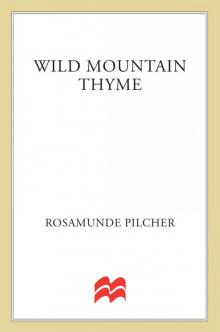 Wild Mountain Thyme
Wild Mountain Thyme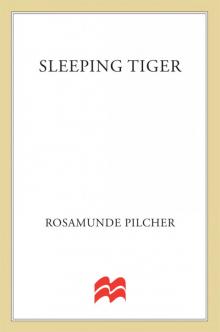 Sleeping Tiger
Sleeping Tiger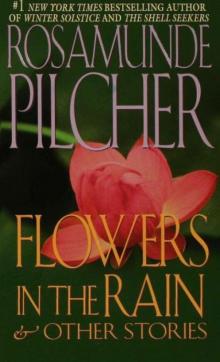 Flowers in the Rain & Other Stories
Flowers in the Rain & Other Stories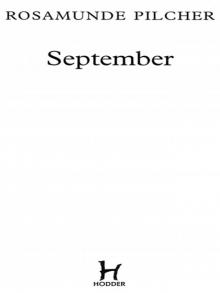 September
September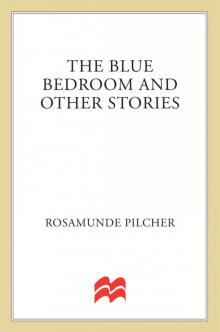 The Blue Bedroom: & Other Stories
The Blue Bedroom: & Other Stories The Carousel
The Carousel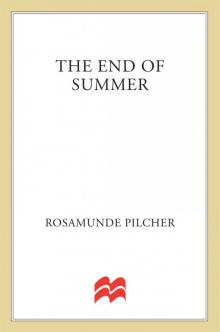 The End of Summer
The End of Summer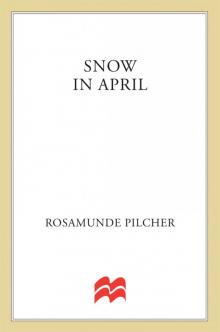 Snow in April
Snow in April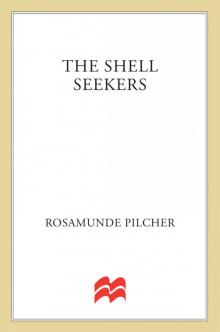 The Shell Seekers
The Shell Seekers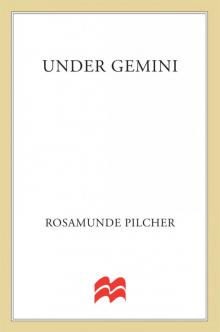 Under Gemini
Under Gemini The Empty House
The Empty House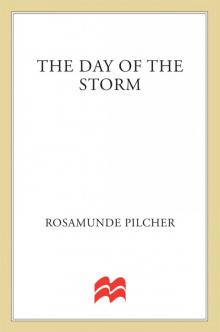 The Day of the Storm
The Day of the Storm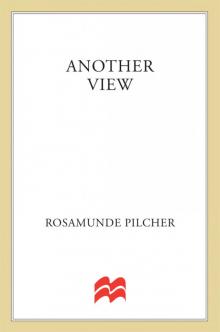 Another View
Another View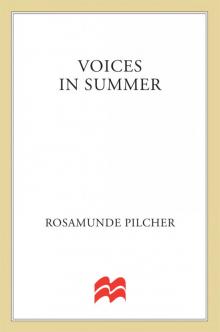 Voices in the Summer
Voices in the Summer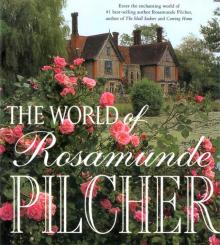 The World of Rosamunde Pilcher
The World of Rosamunde Pilcher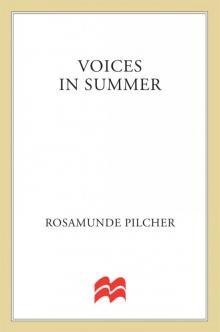 Voices In Summer
Voices In Summer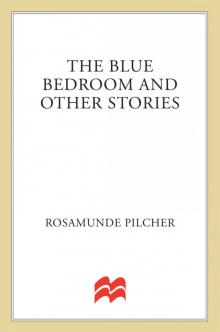 Blue Bedroom and Other Stories
Blue Bedroom and Other Stories